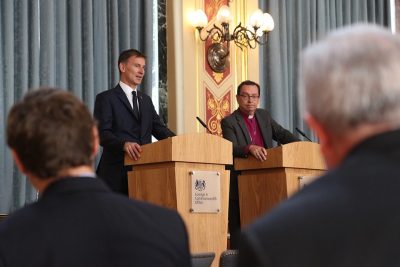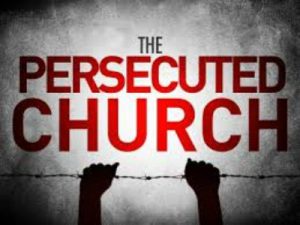
By Ann Marie Foley - 11 July, 2019

Foreign Secretary Jeremy Hunt (left) and Bishop Philip Mounstephen
Aid to the Church in Need has welcomed a British report which states that violence against Christians is at “near genocidal levels”.
The report was commissioned by the UK Foreign Secretary Jeremy Hunt, and was prepared by the Right Reverend Philip Mounstephen, the Anglican Bishop of Truro.
Mr Hunt said there needs to be change in how the UK treats worldwide anti-Christian persecution and it must be ready to sanction abusers of religious rights. He said the government’s response to discrimination against Christians has not been in proportion with the scale of the problem.
“The report recommends that I instruct my officials to define this abuse, and I believe we should do that by calling it out clearly with the label Christophobia,” he said.
Mr Hunt and his fellow candidate for the office of leader of the Conservative Party and Prime Minister, Boris Johnson, both welcomed the report and said that they would protect religious freedom.
Aid to the Church in Need (ACN) provided research into the extent of persecution in Africa, the Middle East and South Asia. The Catholic organisation has called for more government action in response to violence against Christians.
ACN’s UK director Neville Kyrke-Smith, said: “We hope that whoever the new Prime Minister may be that he will implement in full the recommendations of this report.”
He said ACN was pleased to have been involved in this report. “It is an encouragement that these issues are finally being recognised at the right level. It is so important that the challenges faced by people of Christian faith and other minorities are recognised by our Foreign & Commonwealth Office.”
In the preface to the report Bishop Mountstephen said: “It seems to me that we currently face two existential threats to human flourishing and harmonious communities: climate change and the systematic denial of Freedom of Religious Belief (FoRB). We are beginning to pay proper attention to the former. It is high time we paid proper attention to the latter.”
The report states that while it is impossible to know the exact numbers of people persecuted for their faith, it is estimated that one-third of the world’s population suffers from religious persecution in some form, with Christians being the most persecuted group. It adds that the acts of violence and other intimidation against Christians are becoming more widespread and more severe.
The report quotes the Pew Research Center which concluded that in 2016 Christians were targeted in 144 countries, an increase from 125 in 2016.
The 2019 World Watch List Report on anti-Christian oppression stated that around 245 million Christians suffer high levels of persecution or worse – an increase of 30 million from the previous year. Open Doors also stated that within five years the number of countries classified as having extreme persecution had risen from one (North Korea) to 11.
The report states that in some regions the level and nature of persecution is close to meeting the international and UN definition of genocide. For example, the eradication of Christians and other minorities by violent means was revealed to be the objective of extremist groups in Syria, Iraq, Egypt, north-east Nigeria and the Philippines.

This leads to internal displacement and exodus. In Syria the Christian population has declined from 1.7 million in 2011 to below 450,000 and in Iraq (mainly through ethnic cleansing of ancient Christian communities from the Nineveh Plains) Christian numbers have dropped from 1.5 million before 2003 to below 120,000 today.
The types of persecution ranges from mass violence such as the bombing of churches in Egypt, Pakistan and Indonesia, to killing or kidnapping of individuals or groups such as Christian girls in Pakistan and Nigeria or individual nuns, priests and pastors. Torture and imprisonment takes place in the Democratic People’s Republic of Korea, while militant vigilante groups patrol the streets looking for Christians in India.
There is social persecution such as preventing or interfering with Christians holding meetings or services in Saudi Arabia. Laws have been used to persecute Christians such as Asia Bibi in Pakistan who received the death penalty for blasphemy. Up to 100 more blasphemy cases have been registered, and a similar number of individuals are currently serving prison terms in that country.
On Tuesday, Archbishop Eamon Martin celebrated Mass for unveiling of a statue of St Oliver Plunkett in honour of martyrs “yesterday, today and tomorrow”.
In his homily he said: “In some parts of the world, our brothers and sisters in Christ are finding strength to endure suffering, or even death, for their faith – the news in recent months from Sri Lanka and Burkina Faso reminds us that persecution and martyrdom are not something from the past, but are a cruel reality today for many of our fellow Christians, of all traditions and denominations.”
He said that Christians nowadays are being persecuted because they are standing up in the name of Christ for peace, reconciliation and justice and in defence of the poor.